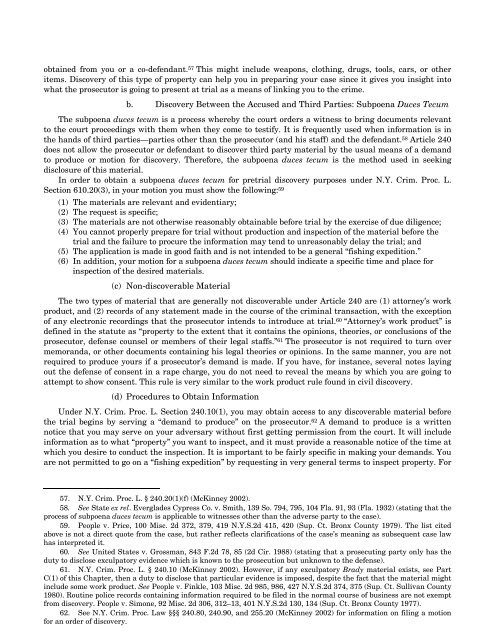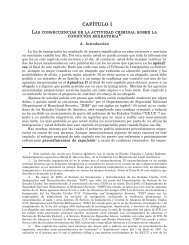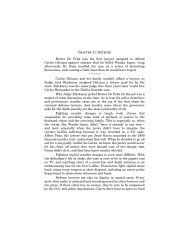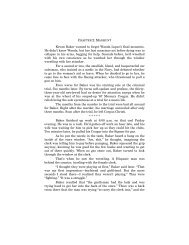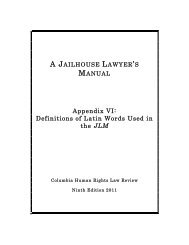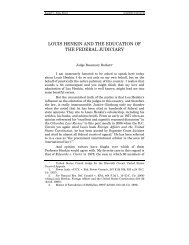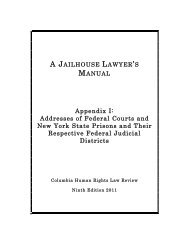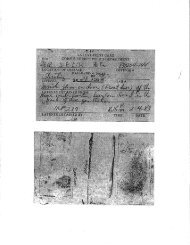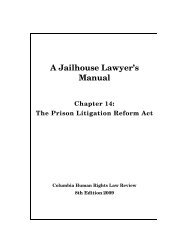A Jailhouse Lawyer's Manual - Columbia Law School
A Jailhouse Lawyer's Manual - Columbia Law School
A Jailhouse Lawyer's Manual - Columbia Law School
You also want an ePaper? Increase the reach of your titles
YUMPU automatically turns print PDFs into web optimized ePapers that Google loves.
obtained from you or a co-defendant. 57 This might include weapons, clothing, drugs, tools, cars, or other<br />
items. Discovery of this type of property can help you in preparing your case since it gives you insight into<br />
what the prosecutor is going to present at trial as a means of linking you to the crime.<br />
b. Discovery Between the Accused and Third Parties: Subpoena Duces Tecum<br />
The subpoena duces tecum is a process whereby the court orders a witness to bring documents relevant<br />
to the court proceedings with them when they come to testify. It is frequently used when information is in<br />
the hands of third parties—parties other than the prosecutor (and his staff) and the defendant. 58 Article 240<br />
does not allow the prosecutor or defendant to discover third party material by the usual means of a demand<br />
to produce or motion for discovery. Therefore, the subpoena duces tecum is the method used in seeking<br />
disclosure of this material.<br />
In order to obtain a subpoena duces tecum for pretrial discovery purposes under N.Y. Crim. Proc. L.<br />
Section 610.20(3), in your motion you must show the following: 59<br />
(1) The materials are relevant and evidentiary;<br />
(2) The request is specific;<br />
(3) The materials are not otherwise reasonably obtainable before trial by the exercise of due diligence;<br />
(4) You cannot properly prepare for trial without production and inspection of the material before the<br />
trial and the failure to procure the information may tend to unreasonably delay the trial; and<br />
(5) The application is made in good faith and is not intended to be a general “fishing expedition.”<br />
(6) In addition, your motion for a subpoena duces tecum should indicate a specific time and place for<br />
inspection of the desired materials.<br />
(c) Non-discoverable Material<br />
The two types of material that are generally not discoverable under Article 240 are (1) attorney’s work<br />
product, and (2) records of any statement made in the course of the criminal transaction, with the exception<br />
of any electronic recordings that the prosecutor intends to introduce at trial. 60 “Attorney’s work product” is<br />
defined in the statute as “property to the extent that it contains the opinions, theories, or conclusions of the<br />
prosecutor, defense counsel or members of their legal staffs.” 61 The prosecutor is not required to turn over<br />
memoranda, or other documents containing his legal theories or opinions. In the same manner, you are not<br />
required to produce yours if a prosecutor’s demand is made. If you have, for instance, several notes laying<br />
out the defense of consent in a rape charge, you do not need to reveal the means by which you are going to<br />
attempt to show consent. This rule is very similar to the work product rule found in civil discovery.<br />
(d) Procedures to Obtain Information<br />
Under N.Y. Crim. Proc. L. Section 240.10(1), you may obtain access to any discoverable material before<br />
the trial begins by serving a “demand to produce” on the prosecutor. 62 A demand to produce is a written<br />
notice that you may serve on your adversary without first getting permission from the court. It will include<br />
information as to what “property” you want to inspect, and it must provide a reasonable notice of the time at<br />
which you desire to conduct the inspection. It is important to be fairly specific in making your demands. You<br />
are not permitted to go on a “fishing expedition” by requesting in very general terms to inspect property. For<br />
57. N.Y. Crim. Proc. L. § 240.20(1)(f) (McKinney 2002).<br />
58. See State ex rel. Everglades Cypress Co. v. Smith, 139 So. 794, 795, 104 Fla. 91, 93 (Fla. 1932) (stating that the<br />
process of subpoena duces tecum is applicable to witnesses other than the adverse party to the case).<br />
59. People v. Price, 100 Misc. 2d 372, 379, 419 N.Y.S.2d 415, 420 (Sup. Ct. Bronx County 1979). The list cited<br />
above is not a direct quote from the case, but rather reflects clarifications of the case’s meaning as subsequent case law<br />
has interpreted it.<br />
60. See United States v. Grossman, 843 F.2d 78, 85 (2d Cir. 1988) (stating that a prosecuting party only has the<br />
duty to disclose exculpatory evidence which is known to the prosecution but unknown to the defense).<br />
61. N.Y. Crim. Proc. L. § 240.10 (McKinney 2002). However, if any exculpatory Brady material exists, see Part<br />
C(1) of this Chapter, then a duty to disclose that particular evidence is imposed, despite the fact that the material might<br />
include some work product. See People v. Finkle, 103 Misc. 2d 985, 986, 427 N.Y.S.2d 374, 375 (Sup. Ct. Sullivan County<br />
1980). Routine police records containing information required to be filed in the normal course of business are not exempt<br />
from discovery. People v. Simone, 92 Misc. 2d 306, 312–13, 401 N.Y.S.2d 130, 134 (Sup. Ct. Bronx County 1977).<br />
62. See N.Y. Crim. Proc. <strong>Law</strong> §§§ 240.80, 240.90, and 255.20 (McKinney 2002) for information on filing a motion<br />
for an order of discovery.


